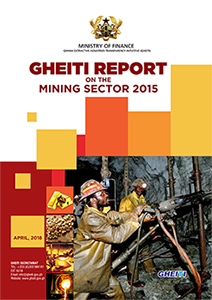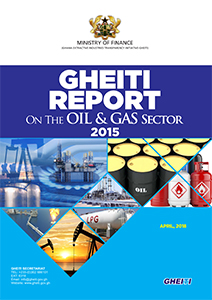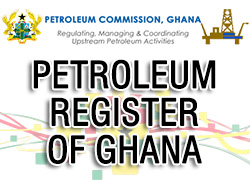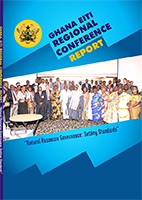| Rolling out EITI in the petroleum sector: GHEITI CONSULTS STAKEHOLDERS ON REVENUE DATA TEMPLATES |
 |
 |
 |
|
A major assurance to both Ghanaians and the country's development partners that Ghana may not after all, go the way of its neighbouring African oil producers, for whom the discovery of oil has been more of a curse than a blessing, is the declaration of intent by the National Democratic Congress (NDC) government to extend the Extractive Industries Transparency Initiative (EITI) to the oil and gas sector. The Extractive Industries Transparency Initiative (EITI) was launched at the World Summit on Sustainable Development in Johannesburg in 2002, as a global effort to end the culture of opacity and lack of accountability in the generation and use of extractive sector revenues especially in natural resource-endowed countries, and to ensure that resource extraction contributes to national development and poverty reduction in the host countries. The initiative requires implementing countries to regularly publish payments and receipts from the extraction of their natural resources, and to ensure that this information is accessible to their citizenry. It is believed that by encouraging public disclosures of company payments and government receipts of extractive revenues, citizens of resource dependent countries will be empowered to demand accountability in terms of how these revenues are used by their governments. Ghana signed on to the initiative in 2003 and has since produced seven EITI audit reports. The seventh report was launched in Accra on Wednesday, October 26 2011. The reports provide useful insights into policy gaps and institutional weaknesses which impede Ghana's ability to maximize its benefits from the mining sector and makes recommendations for addressing these weaknesses. "EITI implementation in the mining sector has been a useful exercise. It has led to a review of royalty rates and some institutional reforms necessary to prevent revenue losses in the mining sector", says the Coordinator of the Ghana Extractive Industries Transparency Initiative (GHEITI), Mr. Franklin Ashiadey. Since government served notice in 2009 that it was going to fulfill its manifesto pledge to extend the initiative to the oil and gas sector, the GHEITI National Steering Committee, a multi-stakeholder group comprising government, companies, and civil society, has been working assiduously to realize the pledge. The Committee itself has been re-constituted to include oil and gas sector agencies of government, companies and representatives of the Civil Society Platform on Oil and Gas. The new Committee has organized series of sensitization meetings for relevant actors in the oil and gas sector, local government representatives, and traditional authorities. During the last quarter of 2009 the Committee requested Boas and Associates, an Accra-based accounting firm that currently serves as the EITI auditor for Ghana, to develop for its consideration, draft templates for capturing oil and gas revenue data; and in 2010 met in Sogakope to review and adopt the templates. The Steering Committee has since subjected the draft templates to stakeholder review, and from October 5 to 7, 2011 it presented these templates to representatives of the local governments in the six frontline oil districts, traditional authorities, civil society representatives and the media at a workshop in Takoradi organized to solicit the Western region's input into the finalization of the templates. It was apparent that the templates presented will have to undergo further revision as participants raised pertinent questions related to the adequacy of the templates in respect of the revenue streams provided for in the Petroleum Revenue Management Law. Some felt for instance that it was necessary to capture payments to the petroleum funds, as well as returns on the funds' investments in the Government Reporting Template, while others want the operating costs of the companies included in the Company Reporting Templates. The forum was chaired by Awulae Adjaye Annor, the omanhene of the Nzema West Traditional Area, who demonstrated profound understanding of the issues the Ghana EITI seeks to address in the oil and gas sector. He did not hide his disgust at the display of ignorance and ineptitude by the newly appointed Ahanta West District Chief Executive (DCE.) who told the forum he did not know of the Revenue Management Law and sought to scold the organizers of the event for not making copies available to participants "I am not a government representative. I am a traditional ruler; and yet I have followed through the enactment of this law. I have conducted searches on the internet whenever I needed information. I simply cannot excuse this kind of ignorance from a person who is supposed to represent the government at the local level", he reacted, rather harshly to the poor DCE. |










